Top Gear: Two decades of the show from Jeremy Clarkson to Freddie Flintoff
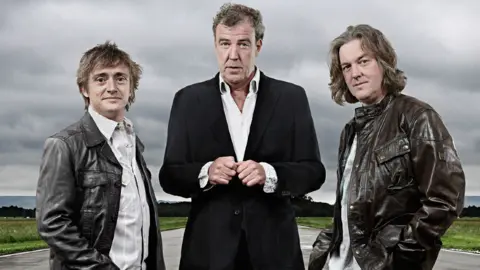 BBC
BBCMotoring series Top Gear has always occupied a precarious position within the BBC.
For the last two decades, the show was one of the corporation's biggest earners, exported all around the world. But it also repeatedly caused controversy, and some of its presenters have been involved in serious crashes.
Balancing the commercial value of Top Gear with the controversies and dangers it brings with it was always delicate, and the show has now been paused after presenter Andrew 'Freddie' Flintoff was badly injured last year.
The former cricketer had an accident during filming last December, which brought production on the series to a halt. He later reached a settlement with production company BBC Studios in a deal reportedly worth £9m, reflecting two years of lost earnings.
Flintoff had hosted the show alongside Paddy McGuinness and Chris Harris since 2019. After a period of significant turmoil for the programme involving a game of presenter musical chairs, the trio had steadied the Top Gear ship in recent years.
If you've been past the new BBC Studios office in Bristol recently, where the show's production team has been based since last year, you might have seen a large Top Gear logo displayed on the side of the building.
The prominence is a reflection of how much the show means to the corporation - a tentpole series which, along with the likes of Doctor Who and Strictly Come Dancing, is considered one of the core BBC brands.
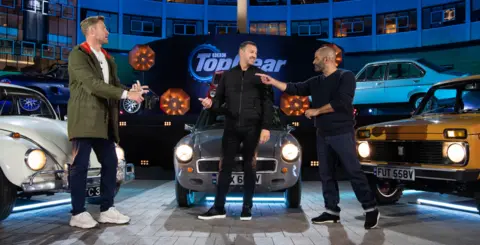
Launched in 2002, Top Gear was a revival of the original series of the same name, which ran from 1977 until 2001 and was hosted by presenters including Angela Rippon, Tom Coyne and Noel Edmonds.
One of the show's other regular faces was a young Jeremy Clarkson, whose blunt reviews of cars proved popular with viewers until his departure from the series in 1999.
The BBC eventually cancelled the half-hour show two years later after falling ratings. Many of the production staff and presenters moved to the recently-launched Channel 5 to work on a new motoring show, Fifth Gear.
But producer Andy Wilman had another idea.
Together with Clarkson, he came up with the idea for a new format for Top Gear that would freshen up the series for the BBC.
Instead of the magazine treatment that had been in place since the 1970s, the pair proposed anchoring it from a studio. A live audience undeniably added energy and pace.
Celebrity guests were also incorporated into the format with a new segment - Star in a Reasonably Priced Car.
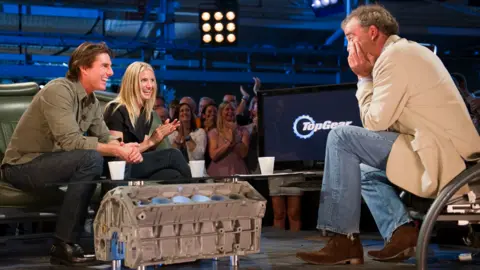
But the real magic came from the chemistry and japes of the trio at the heart of the programme - Clarkson, Richard Hammond and James May. (Jason Dawe featured in the first series but was replaced by May from the second.)
Clarkson was and still is a divisive figure - but he had a certain magic on screen that even his critics would struggle to deny. Hammond and May proved the perfect sidekicks to his gigantic personality.
Ratings for the relaunched Top Gear were a considerable improvement - and the trio would remain on the programme for well over a decade.
But health and safety was always a worry with a show that thrived on stunts and speed, and Flintoff's accident in 2022 was not the first time a presenter had been injured.
Hammond was involved in a serious crash while filming in 2007. He had been driving a jet-powered dragster at nearly 320mph.
He survived, but earlier this year said he worried that his worsening memory loss was linked to the crash.
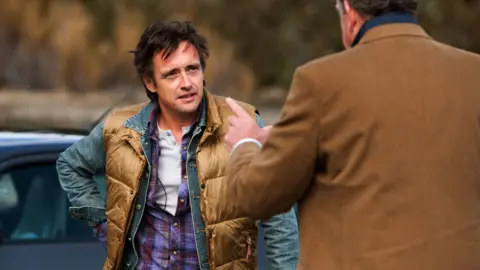
Clarkson, Hammond and May also became embroiled in a string of controversies - which are so high in number they would warrant a separate article. Many related to complaints from some viewers that the hosts were sometimes insensitive towards other cultures.
The trio regularly travelled as part of the series, and often made jokes at the expense of the places they were filming, which played up to stereotypes. Some viewers said there were homophobic or racist undertones.
In 2014, their car was attacked in Argentina after some locals mistakenly thought the FKL in its number plate was a deliberate reference to the 1982 Falklands War.
Clarkson was given what he called his "final warning" the same year, after claims he used a racist word during filming.
At the time, he said the BBC had told him he would be sacked if he made "one more offensive remark, anywhere, at any time".
The following year, the presenter left the show and the BBC after punching a producer over a row about the availability of hot food during filming. He later apologised.
He, Hammond and May were immediately snapped up by Amazon and launched a new series, the Grand Tour, in 2016 - although Clarkson would have more success years later with another series for the streamer, which followed his attempts to run a farm in the Cotswolds.

A tumultuous time for Top Gear followed the trio's departure. Naturally, the BBC were keen to keep the show running. Beyond the series itself, the brand earned money from live shows, books, DVDs, a magazine and other merchandise. Previous estimates suggested the series brought in £50m to the BBC per year.
Chris Evans took over after Clarkson's departure, but his iteration of the show was poorly received. That era, too, had its own controversies - such as when his co-host, former Friends star Matt LeBlanc, and a racing driver performed "doughnuts" near the Cenotaph war memorial in London.
Despite being an experienced broadcaster and car enthusiast, Evans, for some reason, did not quite work with the show's format. He hosted one season before leaving. LeBlanc, however, stayed on.
The actor teamed up with car journalists Chris Harris and Rory Reid for a series that was better received. But he eventually left too, and the presenting line-up was revamped once more.
Two new faces were announced in late 2018 - with Take Me Out host Paddy McGuinness taking the reins alongside Flintoff, while Harris was retained as a third presenter.
There was palpable relief among producers and BBC bosses when the new hosts' first episode was broadcast the following year. The show was clearly in safe hands.
McGuinness was a consummate entertainment presenter - a familiar face to viewers who made the programme more accessible. Harris brought the car knowledge and helped the show maintain its core values.
Flintoff's role was the daredevil - the one most likely to be put forward for pranks or stunts. The opening episode of the 2020 series saw him bungee jump, while strapped into a car, off a dam, in one of the most ambitious episodes the show had ever seen.
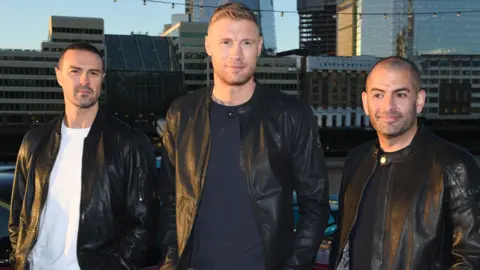 Getty Images
Getty ImagesThe show continued throughout the Covid pandemic - with studio segments filmed outdoors to comply with social distancing rules, and trips filmed around the UK instead of overseas.
Normal service resumed after lockdowns lifted, and it was around this time that production of the show moved to Bristol.
But filming was suspended after Flintoff was injured. Details of his crash were not made public, but it was widely reported he'd sustained severe injuries to his face and jaw.
The Sun reported that the car had flipped over, but added that Flintoff had only been travelling at 22mph when he crashed.
The Health and Safety Executive (HSE) regulator looked into the matter but said it would not be investigating further after completing enquiries. It is understood the circumstances of the incident did not meet the threshold for further investigation.
Flintoff was only photographed for the first time since the accident in September, at a cricketing event, and still had visible facial injuries.
Their severity, even after nine months of recovery, was plain to see. Production on the series had not resumed in the meantime, and many assumed that it never would.
Resting the show gives the BBC time to regroup. It is not yet clear how long the hiatus might last, and still not impossible it could ultimately be cancelled.
Meanwhile, it's unlikely the BBC will try to fill the gap in the schedule with a different motoring series. TV formats based on cars are hardly the saviour of television - or far more of them would have been successful.
Top Gear achieved a certain alchemy thanks to the personalities who fronted it - and the fact it was broadcast by the BBC made their risqué approach more thrilling. Clarkson, Hammond and May lost some of their appeal when they moved to Amazon, where it didn't seem as much fun to be badly behaved.
There are plenty of viewers who will tell you Top Gear was never the same after Clarkson left. They may be right. No doubt repeats of that golden era will continue on the channel Dave for many years to come.
However, Top Gear has reached a fork in the road. With production on pause, the BBC will be poorer without it - quite literally, given how much money it brought in around the world.
